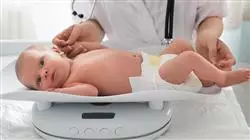
University certificate
The world's largest faculty of medicine”
Description
This professional master’s degree in Pediatric Clinical Nutrition provides students with specific tools and skills to successfully develop their professional activity related to Pediatric Clinical Nutrition"

Specialization in Clinical Nutrition is an essential response from professionals to the healthcare and preventive needs of the population in terms of nutrition and health. Therefore, offering quality training adapted to the needs of these professionals should be the priority of any training center. At TECH we already have this priority and, in order to meet this need of healthcare professionals, we have created this very complete professional master’s degree, developed by a team of experts in the field.
It must be taken into account that advanced training in Pediatric Clinical Nutrition is absolutely necessary in different professional areas (medicine, nursing, nutrition, pharmacy, physiotherapy, etc.) in order to meet the needs of children with pathologies and who require a diet appropriate to their needs. Thus, this professional master’s degree in Pediatric Clinical Nutrition offers the possibility of deepening and actualizing the knowledge of medical professionals, with the use of the most current educational technology. It offers a global vision of clinical nutrition while focusing on the important and innovative aspects of feeding in the pediatric age, from the intrauterine phase to adolescence, as well as the diseases in which feeding plays a highly relevant role.
As this is a professional master’s degree in Pediatric Clinical Nutrition, the student is not conditioned by fixed schedules or the need to move to another physical location, but can access the contents at any time of the day, balancing their work or personal life with their academic life.
Only with proper education, you will know the best way to advise your patients in nutritional matters"
This professional master’s degree in Pediatric Clinical Nutrition contains the most complete and up-to-date scientific program on the market. The most important features include:
- The development of more than 75 clinical cases presented by experts in Pediatric Clinical Nutrition
- The graphic, schematic and eminently practical contents with which it is conceived gather the indispensable information for professional practice
- Exercises where the self-assessment process can be carried out to improve learning
- An algorithm-based interactive learning system, designed for decision making for patients with nutritional challenges
- Theoretical lessons, questions to the expert, debate forums on controversial topics, and individual reflection assignments
- Content that is accessible from any fixed or portable device with an Internet connection
This professional master’s degree in Pediatric Clinical Nutrition is the best investment you can make in the selection of a refresher program for two reasons: in addition to upgrading your knowledge in Pediatric Clinical Nutrition, you will obtain a degree from TECH Technological University"
The teaching staff includes medical professionals who bring their experience to this training program, as well as renowned specialists from leading societies and prestigious universities.
The multimedia content, developed with the latest educational technology, will provide the professional with situated and contextual learning, i.e., a simulated environment that will provide immersive training programmed to train in real situations.
This program is designed around Problem Based Learning, whereby the professional must try to solve the different Work practice situations that arise during the academic year. For this purpose, the professional will be assisted by an innovative interactive video system created by renowned and experienced experts in Pediatric Clinical Nutrition with extensive experience.
The professional master’s degree in Pediatric Clinical Nutrition allows students to practice in simulated environments, which provide immersive learning programmed to prepare them for real situations"

This 100% professional master’s degree will allow you to balance your studies with your professional work while increasing your knowledge in this field"
Objectives
The professional master’s degree in Pediatric Clinical Nutrition is aimed at facilitating the pediatrician's performance in dealing with patients with nutritional orientation needs.

This refresher program will provide you with a sense of confidence in your daily work, which will help you grow both personally and professionally”
General Objectives
- Actualize the pediatrician's knowledge in the new trends in child nutrition, both in health and pathological situations through evidence-based medicine
- Promote work strategies based on the practical knowledge of the new trends in nutrition and its application to child pathologies, where nutrition plays a fundamental role in treatment
- Encourage the acquisition of technical skills and abilities, through a powerful audiovisual system, and the possibility of development through online simulation workshops and/or specific education
- Encourage professional stimulation through continuous education and research
Specific Objectives
Module 1. New Developments in Food
- Review the basics of a balanced diet in the different stages of the life cycle, as well as in exercise
- Manage food databases and composition tables
- Review the chemical composition of foods, their physicochemical properties, their nutritional value, their bioavailability, their organoleptic characteristics and the modifications they undergo as a result of technological and culinary processes
- Describe the composition and utilities of new foods
- Explain basic aspects of food microbiology, parasitology, and toxicology related to food safety
- Analyze the operation of milk banks Explain the new developments and available evidence on probiotics and prebiotics in infant feeding
Module 2. Current Trends in Nutrition
- Review the new dietary guidelines, nutritional objectives, and recommended dietary allowances (RDA)
- Explain the proper reading of new food labeling
- Incorporate phytotherapy as a coadjuvant treatment in clinical practice
- Identify and classify foods, food products, and food ingredients
- Review current trends in premature infant nutrition
- Explain the latest evidence on food allergies and intolerances
Module 3. Clinical Nutrition and Hospital Dietetics
- Assess and calculate nutritional requirements in health and disease at any stage of the life cycle
- Analyze the different methods for assessing nutritional status
- Interpret and integrate anthropometric, clinical, biochemical, hematological, immunological, and pharmacological data in the patient's nutritional assessment and dietary-nutritional treatment
- Manage the different types of nutritional surveys to assess food intake
- Evaluate and maintain adequate hygiene and food safety practices, applying current legislation
- Evaluate and prescribe physical activity as a factor involved in nutritional status
Module 4. Physiology of Infant Nutrition
- Update the drug-nutrient interaction and its implication in the patient’s treatment
- Identify the relationship between nutrition and immune status
- Define the fundamental of Nutrigenetics and Nutrigenomics
- Review the psychological bases and biopsychosocial factors that affect human eating behavior
- Explain the relationship of physiology and nutrition in the different stages of infant development
- Describe the main malabsorption syndromes and how they are treated
Module 5. Artificial Nutrition in Pediatrics
- Perform nutritional assessment in pediatrics
- Reflect on the role of human milk as a functional food
- Describe new formulae used in infant feeding
- Incorporate the different techniques and products of basic and advanced nutritional support related to pediatric nutrition into clinical practice
- Evaluate and monitor the supervision of children on nutritional support
Module 6. Infant Malnutrition
- Predict patients’ nutritional risk
- Early detection and evaluation of deviations due to excess or deficiency, quantitative and qualitative deviations from the nutritional balance
- Identify children at nutritional risk who are eligible for specific support
- Identify children suffering from malnutrition
- Describe the correct nutritional support for a malnourished child
- Classify the different types of malnutrition and their impact on the developing organism
- Identify the appropriate nutritional therapy for pediatric patients with chronic pulmonary pathology
Module 7. Childhood Nutrition and Pathologies
- Analyze the implications of nutrition in the growth process and in the prevention and treatment of different childhood pathologies
- Explain current trends in the nutrition of infants with delayed intrauterine growth and the implication of nutrition on metabolic diseases
- Reflect on the etiology, repercussions, and treatment of childhood obesity
- Explain the nutritional treatment of the most frequent deficiency diseases in the present environment
- Define the role that fats play in children’s diets
- Review the pathogenesis and update the treatment of inborn errors of metabolism
- Assess the psychological and physiological aspects involved in eating disorders in young children
- Identify exclusion foods in the diets of children with celiac disease
- Identify dietary factors related to bone metabolism
- Explain managing children with gastroesophageal reflux
- Describe the main malabsorption syndromes and how they are treated
Module 8. Nutrition and non-digestive pathologies in childhood
- Identify the repercussion that a pregnant and lactating mother's nutrition has on the intrauterine growth and evolution of new-borns and infants
- Describe the nutritional requirements in the different periods of childhood
- Calculate child and adolescent athlete dietary needs and risks
- Reflect on new trends and models in infant feeding
- Reflect and identify risk factors in school and adolescent nutrition
- Identify eating behavior disorders
- Explain the treatment of dyslipidemias and the role that nutrition plays in their genesis and treatment
- Manage diabetic children's diet
- Assess the nutritional support of children with cancer in different situations
- Reflect on the role of nutrition in autistic children
- Review the rationale for dietary support of acute diarrhea
- Describe the management of nutritional support in inflammatory diseases
- Reflect on the relationship between constipation and infant nutrition
- Define the dietary management of children with nephropathy
- Review the dietary management of oral cavity pathologies in children
- Explain the implications that nutrition can have in the treatment of liver diseases

Take the step to get the latest information on Pediatric Clinical Nutrition"
Professional Master's Degree in Pediatric Clinical Nutrition
The role that nutrition plays in the optimal functioning of the body is so fundamental that colostrum is needed from the first hour of life to ensure survival. From this point on, biological development is entirely dependent on the nutritional factor, which is why particular attention to this aspect during infancy is more than necessary. Wanting to contribute to the acquisition of skills that allow to fully develop in this branch of medicine, TECH Technological University offers its Master in Clinical Nutrition in Pediatrics: a journey through eight thematic modules of a virtual nature where you can learn from nutritional advances and trends (organic and transgenic foods, for example) to digestive and non-digestive pathologies during the infant stage. All this, from the versatility and convenience offered by distance education. We know that childhood should be one of the priorities in the health sector and, however, few educational offerings provide the opportunity to delve into a subject of such importance as food, so here at TECH we train you with the most efficient curricular standards.
Join pediatric excellence
Nutritional disorders such as anemia, obesity, overweight, among others, can be avoided from childhood, because it is during these early stages of life that eating habits are fixed. A balanced diet that prioritizes cereals, fruits and vegetables and limits the consumption of foods high in sugar, for example, can be the determining link that mitigates future diseases. Each case, of course, is particular and depends on the child itself, taking into account multiple factors such as age, population zone, genetic background, etc. Our Master will give you, with the help of a highly qualified teaching staff, the theoretical and practical tools necessary to serve as an expert in counseling, diagnosis and treatment of the various nuances that make up the nutrition in children. Do you want to expand your medical skills and excel in a sector of great humanitarian impact as pediatrics? Join the TECH community and transform your vocational passion into a Master's degree that will leave a mark.






